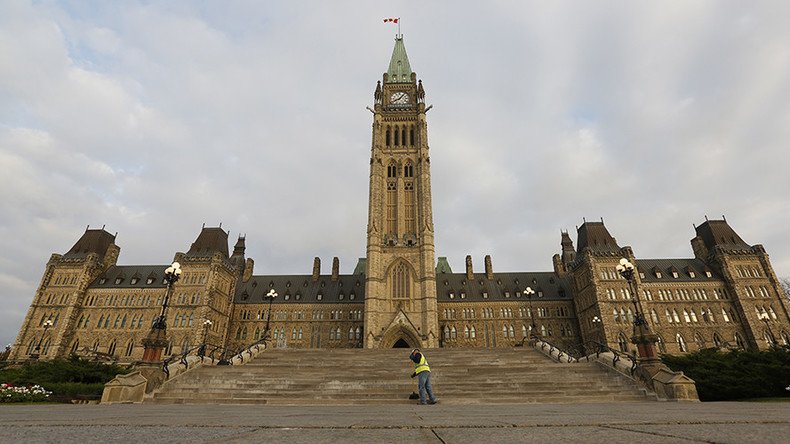Canada passes US-style sanctions bill targeting ‘corrupt’ Russian officials

The Canadian Senate has passed Bill S-226, known as the Sergei Magnitsky Law, mirroring similar US legislation. Moscow has repeatedly slammed the bill as a violation of international law and vowed to respond.
Although the bill, titled “Justice for Victims of Corrupt Foreign Officials Act (Sergei Magnitsky Law),” envisions imposing sanctions on any foreign national, not only on Russians, it mentions exclusively the high-profile cases linked to Russia in its preamble.
Among them is the death of Sergei Magnitsky in a pre-trial detention facility in 2009. Magnitsky was a tax accountant employed by the US-British investor Bill Browder, who was accused by the Russian authorities of orchestrating large-scale tax evasion and embezzling hundreds of millions of rubles from the Russian budget. The lawyer was a prime suspect in the investigation. Browder, however, insisted that Magnitsky fell victim to persecution and torture by the Russian penitentiary system after he allegedly uncovered corruption crimes by Russian tax officials. As result of a three-year lobbying campaign, spearheaded by Browder, in 2012 the US Senate approved the so-called Magnitsky Act, allowing the US to freeze the assets of, and bar entry to, Russians accused of human rights violations. The bill has soured relations between Washington and Moscow.
The other cases listed in the Canadian bill's preamble refer to the death of Alexander Litvinenko in 2006 In London, which was blamed by British investigators on Russian secret services, the assassination of Russian opposition politician Boris Nemtsov in central Moscow in 2015 and the detention of former Ukrainian pilot turned MP, Nadezhda Savchenko, who was tried in a Russian court and found guilty of murdering Russian journalists in Eastern Ukraine. She was subsequently freed in a prisoner swap for two Russian nationals jailed by Kiev.
Senate passes @SenAndreychuk’s Bill #S226 as modified by the House of Commons: https://t.co/Ae56Pzye19#SenCA#cdnpolipic.twitter.com/j62trELdvu
— Senate of Canada (@SenateCA) 17 октября 2017 г.
A foreign national is subject to the restrictions under the Canadian version of the Magnitsky Law if he or she is found to be complicit in torture or other human right violations against “individuals in any foreign country” who wants to shed light on the illegal activity by the government or to “obtain, exercise, defend or promote” human rights. The bill also targets foreign nationals involved in corruption.
Speaking on the bill after it was unanimously approved by the Canadian House of Commons in early October, Canada’s Foreign Minister Chrystia Freeland said that the legislation was designed to enable Canadian authorities to impose sanctions and travel bans on foreigners found to be complicit in these offenses.
The bill’s final reading was passed by the Senate on Tuesday. To become law, it now requires royal assent to be given by Canada’s Governor General, which is usually a mere formality.
The legislation's apparent focus on the alleged misdeeds by Russian officials was slammed by Moscow as aggression that would not be left unanswered.
Russian Foreign Ministry spokesperson Maria Zakharova described the bill as a copy of the “odious American Magnitsky Act,” saying that it will deal a blow to already strained Russia-Canada relations.
“We warn again that in case the pressure of the sanctions put on us increases ... we will widen likewise the list of Canadian officials banned from entering Russia,” Zakharova said in early October.
Konstantin Kosachyov, the head of the Upper House Committee for International Relations, dubbed the bill “yet another confirmation of the existence of the dangerous tendency when national legislation is applied to international relations.” The lawmaker argued that neither Canada, nor any other single country, has the right to play the role of a “global ombudsman.”
“Who has empowered Canada with the right to do such things in the international arena, to decide who is corrupt in other nations and who is not, to apply repressive measures to foreign citizens?” he said.
The spokesman for the Russian Embassy in Ottawa, Kirill Kalinin, said that while the bill is “disguised as a pro-human rights and anti-corruption measure” it goes against Canada’s national interests, as it will alienate “one of the key world powers,” in times when diplomacy is of crucial importance.
“Unfortunately, we are witnessing the continuation of failed policies, pressed by Russophobic elements,” he said in a statement, noting that Russia would respond “with resolve and reciprocal countermeasures.”














